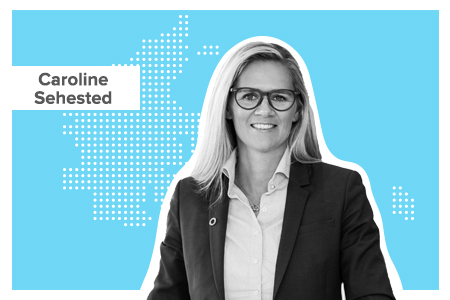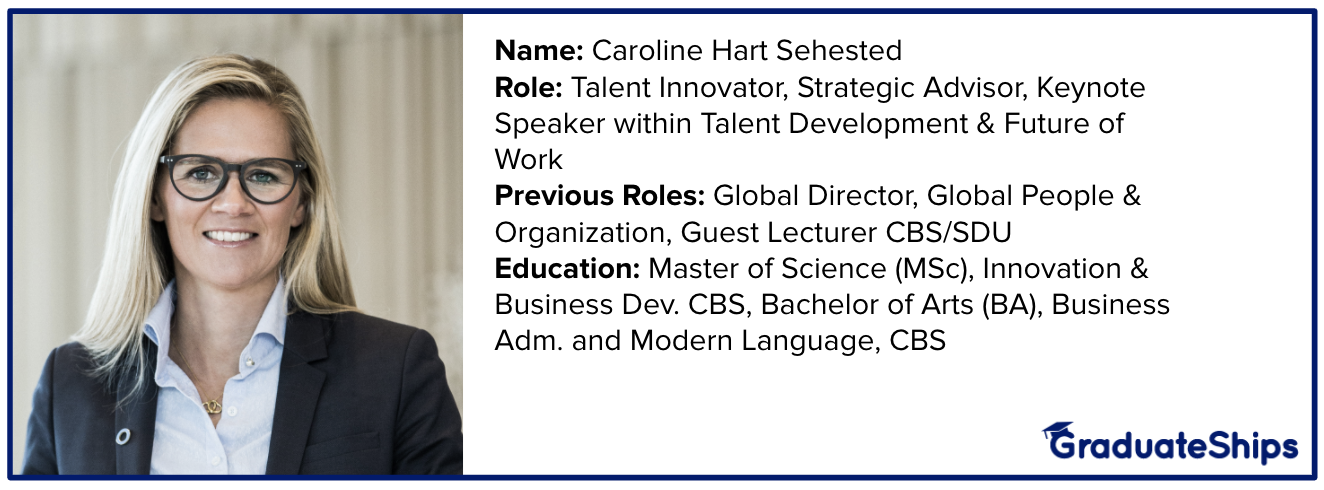
We sat down with Caroline Hart Sehested to get her thoughts on what she thinks it takes to create a successful graduate programme. Caroline is one of the leading capacities in Denmark when it comes to graduate programmes and talent development. She has spent most of her career at Novo Nordisk and has been one of the driving forces behind their very successful graduate programme. Note: She is no longer employed by Novo Nordisk, so consider her comments her own.
Her own career started out as a Business Process Graduate in 2007 at Novo Nordisk. She went on to hold various roles internally at Novo Nordisk and also spent a few years in the US helping her husband get his startup off the ground. After a few years in the states they went back to Copenhagen and she returned to Novo Nordisk where she was promoted to People & Organization Director to build up a Global Centre of Excellence called ‘Global Early Talent’ (focused on Talent Acquisition & Development for Trainees, Interns, Students and Graduates).
November 2019 it was time to try something new in her career and she was eager to utilise her experience within talent development and how companies can adapt to the future of work. Today she works as an independent consultant, strategic advisor and keynote speaker within Talent Management and Future of Work. You might have seen her recently as the TEDXCopenhagen host, where she is taking listeners through the ‘Future of Work’. She can be booked to do talks and workshops, strategic advice and consulting as well as a moderator or facilitator of big events or workshops. You can reach out to her on email or via her Linkedin profile to hear more about how she can help you or your company.

What are some of the core pillars in creating a good graduate programme?
“That’s a good question. I think overall you can divide it into three overall pillars which in my opinion is foundational in creating a good graduate programme:
“For large scale talent programmes such as a Graduate Programme, I think it’s difficult to measure the exact ROI as there are so many different components to it, but I have had good experience in measuring career progression rates and retention rates which can be good ROI indicators.
I think it’s vital that companies spend time to properly reflect whether or not they need a graduate programme and how they need it to be structured. The most important thing is probably, that they do a comprehensive analysis to understand where they will be lacking talents in the future. It is based on that gap analysis, looking 5-10 years into the future, that you should create your programme.”
Caroline emphasises that the Novo Nordisk graduate programme is a strategic business decision which is part of their global Talent Acquisition strategy and during the more than 25 years it has existed, many changes have happened to meet internal needs in the company and external changes from society, technology and education. Despite many changes, the Novo Nordisk graduate programme continues to fosters many key leaders to all corners of Novo Nordisk and looking at the Executive Board this also holds talent who started their career in the Novo Nordisk graduate programme such as Lars Fruergaard (current CEO), Lars Green (Former Novo Nordisk EVP, now Novozymes CFO) and Camilla Sylvest (EVP Novo Nordisk).
She does say that having a graduate programme is an individual company decision and is not necessarily something which all companies can benefit from – it depends on the companies talent strategy.
“The first thing I would say is that you need to consider what your overall strategy is when it comes to talent development and look into pros and cons for a “build vs buy” strategy where you can either buy external talent or you can develop them internally. At Novo we did a bit of both – so we would use internal headhunters for critical senior positions if the talent pipeline did not meet current demands.
At least for Novo Nordisk this balance of build vs buy has worked really well and I believe that companies who have access to a strong internal talent pipeline and still manage to source experienced manager from other companies who can bring new knowledge and lead change, then you have a solid strategy to grow your business
Novo Nordisk has received a tremendous amount of value through the graduate programme by developing internal talent who have since taken up senior leadership positions. So there is definitely value in building your internal talent instead of only hiring externally which can also be a very costly strategy.
I also think there is a lot of value in having employees who have been with the company for a long period of time, who have tried to work in different parts of the world, have a unique network and know the business well. I see many former graduates who are now placed all over the world in different leadership roles. These leaders now carry on a strong company cultural heritage because they have been with Novo Nordisk from the start of their career. All of these talents bring valuable continuity for the business and as a bonus carries on the legacy of a strong company culture which is something you cannot go out and buy externally – it comes with time, long term talent investment and experience.”
I like to use the quote “The war for talent is over – talent won”.
Companies no longer pick their talents – talents pick them based on how the company purpose, culture and work environment fits to their life. I therefore personally believe that companies need to differentiate and offer something special to attract the best talents and with more than 10 years of experience I know that having a graduate programme is a great strategy to attract the best talent and to ensure competitive advantages within talent pipelining for the future.”

“Over the past 10 years more and more new companies have entered the market with a graduate programme and as such the hunt for the best graduates have become more competitive. But I think this is a good thing for the market, as it ensures that companies continuously develop their programs, and particularly good for the graduates, who have more career opportunities to kick start their career in a fast track development program where they can explore, learn and grow from 3-4 different jobs within a few years.
With the growth of graduate programmes, this also means that the companies need to be very clear around how their graduate programme is different and what the purpose of the programme is. In the future, I expect that new generation graduates will be more focused on sustainability and social responsibility.You’ll for sure see companies customizing graduate programmes to meet these needs and communicate specifically around these topics to the graduates to be more attractive in getting the best talent.
In relation to the graduate programme itself, I expect it will become increasingly more up to the graduate him or herself to co-design the learning elements of the graduate programme and the learning curve they are after. So the programmes will offer a lot more flexibility depending on the graduate which I believe will also benefit the company and develop talent who owns their own career and whose development is more and more based on intrinsic motivation and learning.”
“Graduate programmes are created with the intention to build internal talent pipelines and to attract the best talent, so it’s a very relevant question. The key differentiator in my mind is having a strong employer brand. The best way to build and improve this is by using, in my opinion, the best branding tool which is your current employees. You need to use the workforce as ambassadors to help attract the best graduates”.
Concretely Caroline mentions the below as some of her advice on how to attract the best talent:
“At Novo Nordisk diversity came quite naturally due to the global nature of the programme. In my 10 years working with global graduate programmes we always ended up with a 50/50 gender split and a truly global and educational diversity.”
“So if a company struggles with harvesting the amazing benefits of having workforce diversity, a graduate programme is probably one of the strongest strategies I know of, to build current and long term workforce diversity.”
“That’s a really good and important question. Today there are so many companies offering a graduate programme that it can be a bit of a jungle for the applicant. Below is a list of advice:
To learn more about how to get hired, why not hear from Nicolas Norlinger, who actually made it into the graduate program at Novo Nordisk.
“I’m extremely biased here as I have been in a graduate programme myself, but I think it’s an amazing opportunity.You get a huge network in the business and so many amazing opportunities. Many students say it is difficult to choose their first job, so having the opportunity to get a snapshot of different business areas and tasks through a graduate program, before you potentially specialize into a specific direction, is something I wish everyone would do.
I can’t see that there are many downsides, but my best advice to graduates is to always be the captain of your own career development. After a graduate programme it is important to continue exploring, showing results and engagement while acknowledging that you cannot expect the same high level of mentoring and training as you did in the graduate program.”
A similar remark was made by Danfoss postgraduate Kasper Poulsen. In our interview, Kasper emphasized eagerness to learn as a key personal trait to succeed. Read the whole article with the Danfoss postgraduate here.